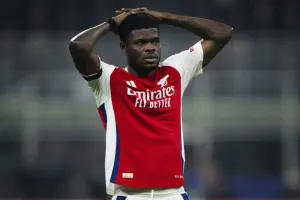Brittney Griner’s Alleged Comments About Caitlin Clark Spark Conservative Outrage

Atlanta Dream star center Brittney Griner has whipped up conservative fury as they accuse her of hurling a racial slur at rival Caitlin Clark.
Moments before the conclusion of the Indiana Fever’s 81-76 victory over the Dream at the State Farm Arena in Atlanta on Thursday, cameras panned to Griner, who critics say labeled Clark “trash” before calling her a “f***ing white girl” in frustration over a foul on Natasha Howard.
While a lack of audio meant it remained unclear whether Griner made the provocative comment, the moment quickly became fuel for controversy and sparked debate online.
A recent WNBA game on May 22, 2025, between the Atlanta Dream and the Indiana Fever has ignited a firestorm of controversy, with Phoenix Mercury star Brittney Griner at the center. A viral video clip from the game, which circulated widely on social media platforms like X, appears to show Griner making remarks directed at rookie sensation Caitlin Clark after fouling out. The comments, interpreted by some as including a racial slur, have provoked outrage among conservative commentators and fans, fueling debates about sportsmanship, race, and perceived double standards in the WNBA. However, the exact nature of Griner’s words remains disputed, and the controversy highlights the challenges of navigating unverified claims in the age of social media.
The Incident
The incident occurred during a heated moment in the game, which saw Clark, the Indiana Fever’s standout rookie and the NCAA’s all-time leading scorer, facing off against a physical Atlanta Dream defense. Griner, a veteran center known for her dominant presence on the court, fouled out late in the game. As she exited, cameras captured her appearing to say “trash” and other remarks directed at Clark. Some posts on X and online reports allege that Griner used the phrase “f**king white girl,” a claim that has driven much of the outrage.
The video, which spread rapidly across social media, lacks clear audio to definitively confirm the exact words spoken. Lip-reading interpretations and secondhand accounts have filled the gap, with some users on X asserting that Griner’s comments were racially charged. These claims have been amplified by conservative voices, including former collegiate swimmer Riley Gaines, who has been vocal about perceived slights against Clark in the WNBA. Gaines and others have framed the incident as evidence of unfair treatment toward Clark, a white player in a predominantly Black league, tapping into broader narratives about race and favoritism in sports.
The Reaction
The backlash from conservative commentators was swift. Posts on X accused Griner of unprofessional conduct and demanded repercussions, with some falsely claiming that she had been “fired” or suspended by the WNBA. These assertions appear to be unverified, as no official statement from the league or the Phoenix Mercury confirms any disciplinary action against Griner as of May 28, 2025. The WNBA has not publicly addressed the incident, and Griner herself has not issued a statement clarifying her remarks.
On the other side, former ESPN journalist Jemele Hill offered context via social media, suggesting that Griner’s comments were likely competitive trash talk rather than racially motivated. Hill pointed to the intense nature of the game and the history of rivalries in the WNBA, urging fans to consider the context before jumping to conclusions. However, her perspective has been largely overshadowed by the outrage narrative, which has found fertile ground among those already critical of Griner’s public persona and the WNBA’s handling of Clark’s meteoric rise.
The Broader Context
Caitlin Clark’s entry into the WNBA has been a lightning rod for discussion. As a white player who has drawn unprecedented attention to women’s basketball, she has faced scrutiny from some quarters for the media hype surrounding her, with critics arguing that it overshadows veteran players. At the same time, Clark has been embraced by many fans, particularly those outside the WNBA’s traditional audience, who see her as a transformative figure. This dynamic has created a polarized environment where incidents like the one involving Griner are quickly weaponized in broader cultural debates.
Griner, meanwhile, remains a polarizing figure herself. Her high-profile detention in Russia in 2022 and subsequent return to the U.S. made her a symbol of resilience for some and a target for others, particularly among conservative critics who have questioned her patriotism. The current controversy has reignited these tensions, with some commentators using the alleged comments to paint Griner as antagonistic or biased.
Unverified Claims and Social Media’s Role
The lack of definitive evidence about Griner’s exact words has not slowed the spread of outrage. Social media platforms like X have played a central role in amplifying the story, with users posting snippets of the video alongside inflammatory captions. Some posts claim that the WNBA is ignoring the incident to protect Griner, while others speculate about a broader conspiracy to marginalize Clark. These narratives, while emotionally charged, often rely on unverified interpretations of the footage rather than concrete evidence.
The absence of an official response from the WNBA or Griner has allowed speculation to flourish. Without clear audio or a statement from those involved, the controversy risks being defined by whoever can frame the narrative most effectively. This dynamic underscores the challenges of navigating viral moments in sports, where partial information can fuel disproportionate reactions.
What’s Next?
As of now, the WNBA has not indicated whether it will investigate the incident or issue a statement. Griner’s alleged comments, if proven to be racially charged, could prompt disciplinary action, but the league’s silence suggests that no such determination has been made. For Clark, the incident adds to the growing pains of her rookie season, where she has faced intense physical play and scrutiny while averaging impressive numbers as a first-year player.
The controversy also raises questions about how the WNBA navigates its growing visibility. With players like Clark bringing new eyes to the league, incidents like this one highlight the challenges of managing rivalries and public perceptions in a polarized cultural landscape. Conservative outrage over Griner’s alleged comments may fade as new stories emerge, but the incident underscores the need for clearer communication from the league to address such disputes before they spiral.
A Call for Clarity
For fans and observers, the lesson is clear: viral clips and social media posts are not always the full story. Without definitive audio or firsthand accounts, the claims about Griner’s comments remain speculative. Those seeking the truth should prioritize primary sources, such as official statements from the WNBA or the players involved, and approach unverified footage with skepticism. In the meantime, the outrage over Griner’s alleged remarks serves as a reminder of how quickly sports can become a battleground for broader cultural debates, often at the expense of nuance and facts.
As the WNBA season continues, both Griner and Clark will likely remain in the spotlight. How they and the league handle this moment could shape the narrative around their careers and the sport itself. For now, the controversy is a case study in the power of perception—and the dangers of rushing to judgment.
Note: This article is based on information available as of May 28, 2025, including posts on X and web reports. Readers are encouraged to verify claims with primary sources and view original footage when possible.







